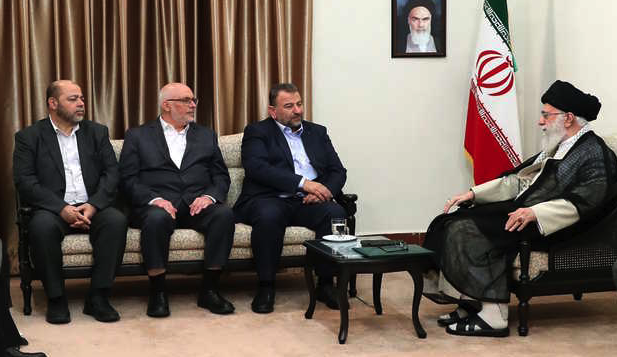August 09, 2019

The Islamic Republic and the Egyptian government are waging a bitter fight for influence in Gaza, hoping to exclude the other from having a say in the enclave.
Egypt is leading a diplomatic campaign to reconcile Hamas with the Palestinian Authority (PA), which oversees the West Bank and claims authority over Gaza although Hamas has had control there for a dozen years. Egypt also has lines out to Israel to prevent another confrontation with Hamas over Israel’s accidental killing of a Hamas member early in July.
Iran has something else in mind. In mid-July, Supreme Leader Ali Khamenehi received a senior Hamas delegation in Tehran. The mood was warm and effusive. Khamenehi said the Palestinian cause is a “religious matter,” the “first and foremost issue for the Muslim world,” where Arabs have tended to pay less attention to Israel as they pay more attention to what they see as an Iranian effort to gain power in the Arab world.
Hamas cut relations with Syria, a close ally of Iran, in 2012, when popular demonstrations broke out against the Syrian government. This decision upset ties with Tehran, although they were never completely severed. Hamas began to reconsider its approach to Iran and Syria in 2017, around the time Ismail Haniyeh became leader of the Hamas political bureau.
A stronger alignment with Iran would only deepen Hamas’ isolation from other Arab capitals. Saudi Arabia, in particular, has intensified its campaign against Hamas leaders.
An Egyptian source was quoted in the media as saying the Egyptian plan includes Hamas transferring control of Gaza to the PA, followed by a national unity government that would include Hamas and other factions, followed by elections, and that the PA, as the ruling authority, would be required to pay salaries for government employees in Gaza and restore electricity and services. That would be a major move, given that Gaza has been under Israeli and Egyptian blockade since 2007, when Hamas took control from PA security forces.
It was Saleh al-Arouri, deputy chairman of the Hamas political office, rather than Haniyeh, meeting with Kha-menehi in Tehran. That was the handiwork of Egypt, al-Monitor reports. Haniyeh had hoped to lead a fundraising tour of Iran, Turkey and Qatar—all on Cairo’s blacklist these days. But Egypt prevented Haniyeh from leaving Gaza, so the call went to Arouri, who is based in Beirut.